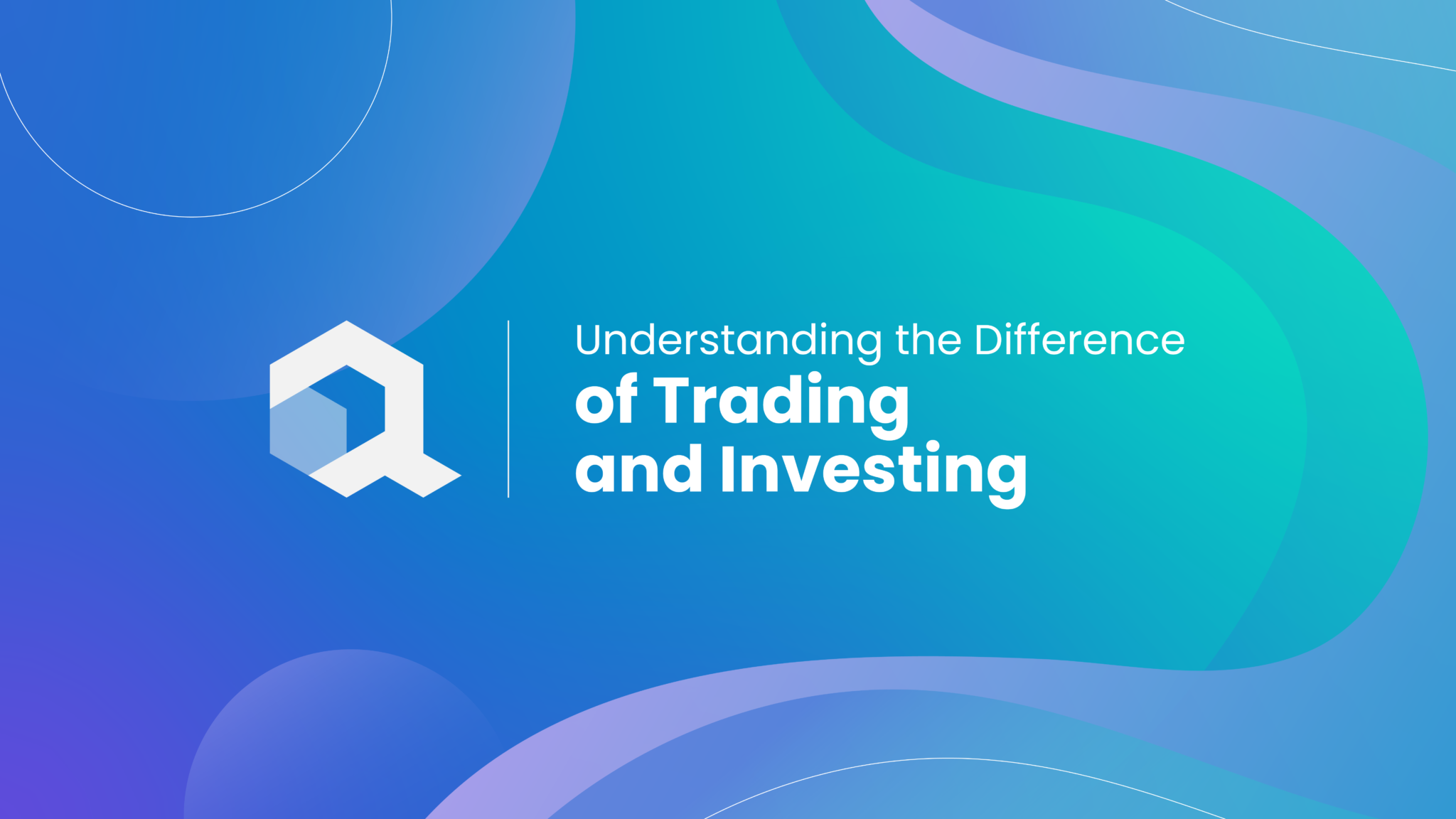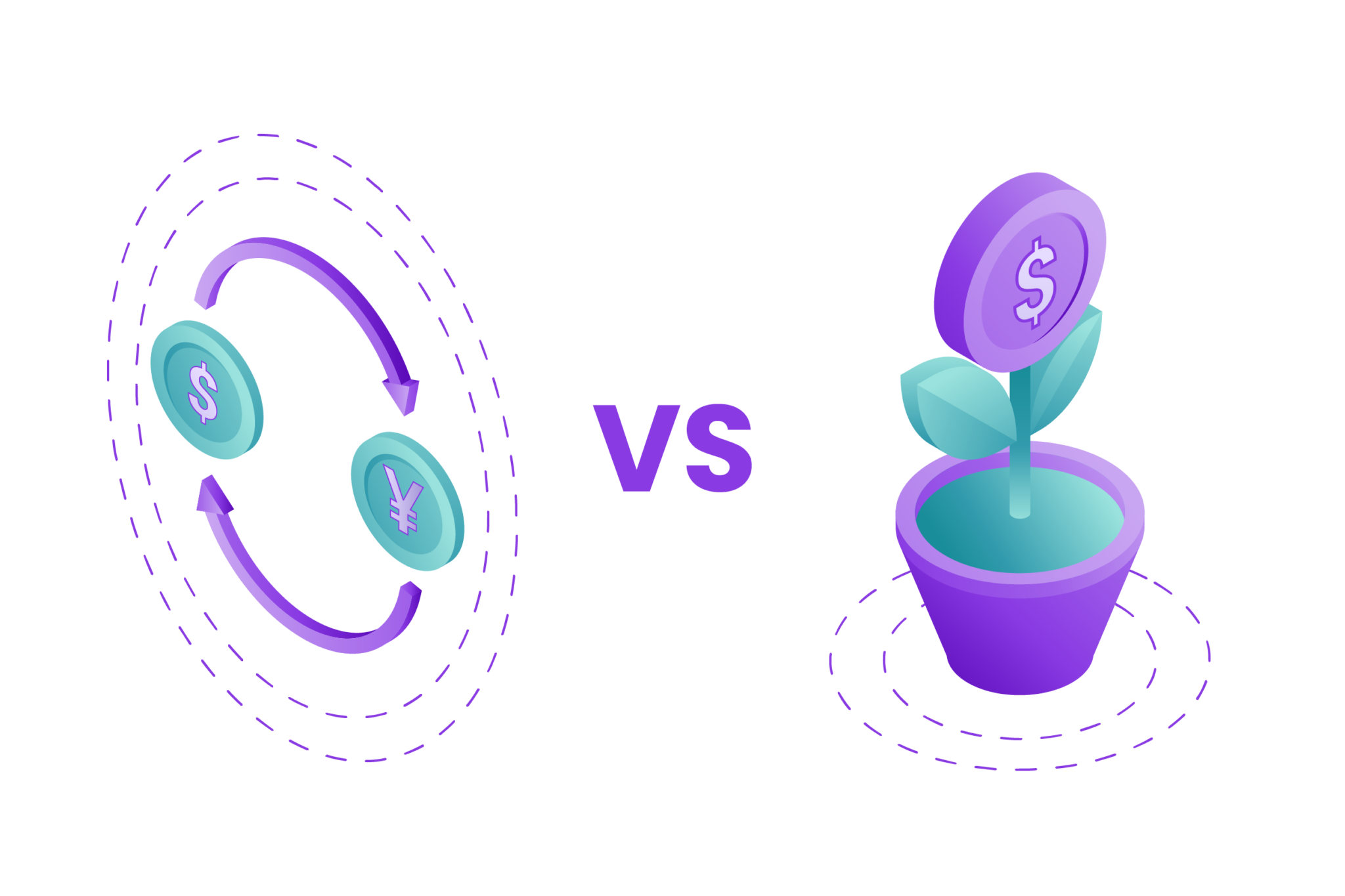
Finance is like a big puzzle with many strategies, each with its own special features. Two big strategies are trading and investing. Even though people sometimes mix up these words, they’re actually very different ways of doing things. The big difference is time and what you want to achieve. Investors wait patiently for their money to grow over the years. Traders want to make money quickly, maybe in just a few minutes.
So, when you think about trading and investing, remember that they’re like two different paths to making money in the money world. Some people might call themselves investors, but they’re really more like traders. Others might be investors who take their time to grow their money slowly.
Remember, there’s no right or wrong way. Both ways can lead to success in the financial world. So, are you more of a trader or an investor? Delve deeper into the contrast between trading and investing by reading below.
Defining The Difference Trading and Investing

Trading involves quickly buying and selling assets for short-term profits. It’s fast-paced and requires monitoring markets closely. Investing is about buying and holding assets for long-term growth. It’s patient and focuses on gradual wealth accumulation. Let’s take a look at how different it is to gain a deeper understanding:
Trading
Buying and selling things like stocks, cryptocurrencies, and other money-related stuff is called trading. Traders do this to try and make money from the prices going up and down really quickly. They use tools like charts and patterns to decide when to buy and when to sell, sometimes holding onto things for just a little while, like minutes, hours, or a few days.
The main goal of trading is to take advantage of how quickly prices change and get quick profits from them. This means traders do lots of transactions, like buying and selling stuff, to try to make more money than if they just held onto their things for a long time.
Traders have some tricks up their sleeves. They might buy something at a low price and sell it at a higher price in a short time. Or they might even sell something they don’t even own yet, hoping to buy it back at a lower price later. This is like betting that the price will go down.
Trading can be exciting, but it’s also risky. Imagine it’s like riding a fast rollercoaster—sometimes you win, sometimes you lose, and it can be really intense. So, trading is a bit like a fast and exciting money game, but it’s not a game for beginners because it can be risky. If you’re not careful, you might end up losing a lot of money.
Investing
Ivesting is like planting a money seed and watching it grow slowly into a big money tree. Investors do this by buying things like stocks and cryptocurrencies and keeping them for a long time. They might wait for years or even decades.
Investors aren’t in a hurry; they know it takes time for their money to grow. They look closely at things like how healthy a company’s finances are, what’s happening in the industry, and how much the company might grow. Their main goal is to build up their money over time, not to get quick profits.
Investors have a secret weapon called compound interest. It’s like magic: the longer you keep your money invested, the more it grows because you’re not just earning money on your original investment but also on the money your investment has already made. While traders jump in and out of the market, investors stay for the long haul. They might buy a mix of things like stocks, bonds, and other money stuff. They wait patiently for their investments to pay off.
It’s not about getting rich quickly; it’s about being patient and letting your money grow over time. Unlike trading, where people want to make quick money, investing is about growing. They’re not worried about the ups and downs that happen every day. Instead, they’re interested in how things are going in the long term.
So, if you’re more like someone who wants to see their money grow slowly and steadily, you might be an investor. Just remember to give it time and care, and it will grow into something big and strong.
Also Read: Market Making: Strategies and Techniques (August 2023)
The Psychology of Trading and Investing

Trading psychology is about understanding how our minds and feelings affect the way traders make choices and trade in the money markets. It’s like looking at why people do what they do when they’re trading. This includes thinking about how our emotions, thoughts, and even how we control ourselves can change the way we trade and the results we get.
People who study trading psychology know that traders aren’t just smart calculators. Additionally, they are affected by their emotions, thoughts, and other factors, which can lead them to make poor decisions.This can lead to making quick choices without thinking much, or even making decisions that don’t work out well.
Emotions are super important in both trading and investing. Traders can feel really strong emotions because they want to make money fast and might win or lose quickly. They might get scared or greedy, and that can make them do things they didn’t plan.
But investors are different. They usually think more about the long run and don’t get as emotional about short-term ups and downs. They might feel something, but it’s not as strong because they care more about the big picture. Either way, it’s about knowing how your feelings and thoughts affect your money choices.
Also Read: How Market Making Algorithms Works?: The Future Of Crypto
Choosing Your Financial Path: Trading, Investing, or Both?

The way investors and traders handle things is different. There’s a big difference in how much you could lose with both. It doesn’t matter if you keep things for a short time or a long time—there’s always a chance you could lose your money. But for traders, this chance is greater. They keep things for a short time, and sometimes they have many different things, like futures and swaps, that regular investors might not have.
Trading isn’t easy. It needs lots of time, effort, and understanding of how the market works. Traders usually know a lot about this stuff. Investors can be experts too, but many aren’t. They might ask people who know about money, like financial advisors, for help.
Choosing between trading and investing depends on what you want to do with your money. If you like quick profits and can handle risks, trading might be good for you. But it takes a lot of time and learning. You need to be okay with stress too. On the other hand, if you want to grow your money slowly and don’t want to keep an eye on the market all the time, investing might be better. It needs patience and discipline. It’s a calmer way of handling your money, which works well for busy people who don’t want to watch the market all day.
Just like how we get things, sometimes it is possible that we can be a mix of traders and investors. Some people like to stick to just one, but being a bit of both can be good too. For example, you could use smart tools to find a good deal on a stock you believe in and also use quick strategies to make sure you’re buying at the right time to save the most money later. It’s like mixing the patience of an investor with the quick thinking of a trader to get the best of both worlds.
Conclusion
In the ongoing debate between trading and investing, we can agree that both can lead to financial success, but they cater to different types of people and lifestyles. Imagine trading and investing as two paths to the same destination: financial success. Traders move quickly, aiming for fast gains, while investors are patient, looking for long-term growth. Choosing the right path depends on understanding your goals and risk tolerance.
Are you up for risks and quick results, or do you prefer a calmer, more gradual approach? It’s like choosing between cake and ice cream; both have their merits. Whether you trade or invest, be prepared. Traders need skills and tools, and investors should research and set goals. Remember, both ways work; it’s about finding what suits you. So, which approach aligns better with your financial goals?
Disclaimer: The information provided by Quant Matter in this article is intended for general informational purposes and does not reflect the company’s opinion. It is not intended as investment advice or a recommendation. Readers are strongly advised to conduct their own thorough research and consult with a qualified financial advisor before making any financial decisions.
I craft stories that make complex ideas clear. I simplify the blend of data science, machine learning, and crypto trading, showcasing how advanced tech and quantitative models analyze data for informed trading choices. Join me in exploring the realm of quantitative trading, where my narratives make intricate concepts easy to grasp.
-
Alifia Berizkyhttps://quantmatter.com/author/alifia-berizky/
-
Alifia Berizkyhttps://quantmatter.com/author/alifia-berizky/
-
Alifia Berizkyhttps://quantmatter.com/author/alifia-berizky/
-
Alifia Berizkyhttps://quantmatter.com/author/alifia-berizky/

